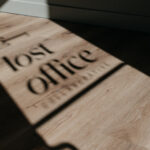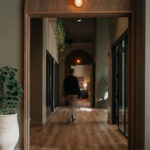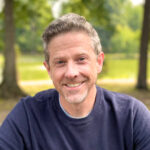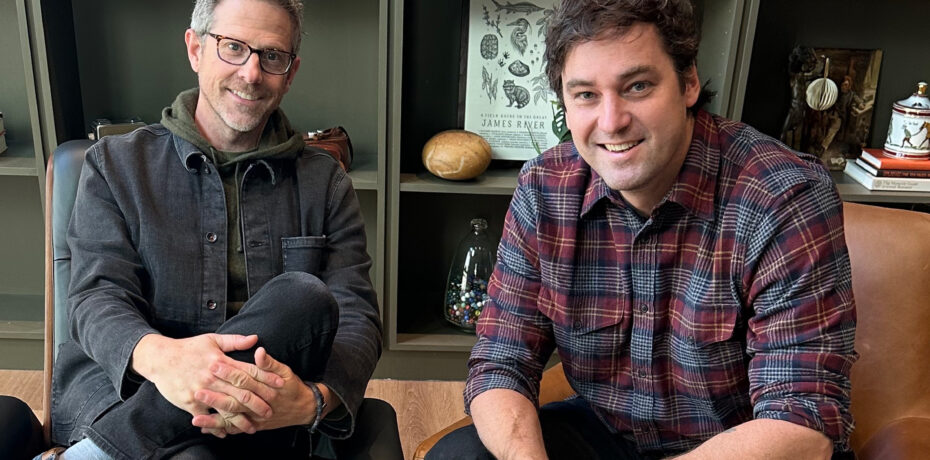We recently found our way to Lost Office Collaborative, Richmond’s newest space designed to help others create better – and get lost together. Lost Office is a full-service, deep-work space for teams and we wanted to find out what truly makes it tick. To do that, we sat down with Lost Office founders and partners, Christian Markow and Mark Brown, to find out how they were able to bring together a unique mix of hospitality, technology, collaborative tools, coaching, and team experiences. By way of our conversation below, you’re invited into the Lost space through the words of those who dreamed it up.
 What gave you the desire to create such a unique space? Is this a passion project for both of you, born from your consultancy, Amphibian? Lost Office Collaborative is really a hybrid of three things: high-service space for teams that’s built from some very sound science around creativity and productivity; thoughtfully designed tools and expertise to help them design better conversations or tackle tough challenges; and unique experiences intended to help them connect in meaningful ways.
What gave you the desire to create such a unique space? Is this a passion project for both of you, born from your consultancy, Amphibian? Lost Office Collaborative is really a hybrid of three things: high-service space for teams that’s built from some very sound science around creativity and productivity; thoughtfully designed tools and expertise to help them design better conversations or tackle tough challenges; and unique experiences intended to help them connect in meaningful ways.
But what got us to even concepting this mash-up was a question we had a lot of passion for – how do humans find more meaning and energy in their work? We’d been thinking about it for years, but weren’t digging into the problem deeply enough with the work we we’re doing. So, we directed all of our energy into answering it. That led to creating a solution for teams and organizations that we aren’t seeing being offered anywhere quite the way we’re doing it. Something that fuses a premium physical space experience with content and consulting.
The design for the actual space started with the phrase “post-apocalyptic workplace.” We wanted to create a feeling for teams that they were entering a place they always wanted … but could never find. Almost like it had been lost in nature. It needed to feel serene and at the same time energizing. Very open and breathable but intimate. And incredibly comfortable and cozy, but pliable and suited for getting work done. The collaboration between Lisa Markow Design, our interior designer and Fultz & Singh, our architects was just magic. The completely got the science and soul we needed to drive the experience. Lisa made sure that everything in the space was there for a reason, that every color, fixture, and texture contributed to the bigger purpose. And Fultz & Singh was flawless in interpreting our ambitions into flow and function in a very beautiful way.






In your own words, “We’re here to help teams improve productivity, re-kindle belief in the meaning of their work, and remind us how special it is to be part of a great team.” Where did the desire to build an environment to enhance team collaboration and cohesion come from?
Before we were Lost, we consulted on brand, innovation, and workplace experience with a number of Fortune 100 companies and some really sharp start-ups. Our method has always been highly collaborative and with a learning and development focus that would teach teams how to do the work they hired us for. It’s an awesome feeling to create real relationships with teams, dig into hard work with them, and walk away feeling like people have grown and evolved in the process.
The reality for way too many organizations, though, is there’s a lot of work done that doesn’t create progress. Projects with hard work behind them that get cancelled or watered down. People creating things that already exist somewhere else in the organization. Decisions that can’t get made, or are made without the right context. Work processes (think meeting culture or comms technologies) that are ridiculously unproductive. The list could go on.
The point is that in many companies, work culture isn’t working. That’s the problem we want to solve.
Give teams the time, space, and tools they need to collaborate and work deeply. The idea of Lost Office Collaborative is to ultimately be the first solution teams think of when they need help with collaboration and creating breakthroughs — whether its space, workshops, tools, coaching, or consulting.
Christian – I read your share about team offsites on LinkedIn. The concept of treating offsites as a design challenge stood out to me. Can you share more about this?
I would love to! Let’s start with the premise that as a workforce we’re very “intelligence-centric” in how we think about productivity. We train and develop for subject-matter expertise and skill. We create technology to help us process more knowledge and complete tasks faster. All important. But what we largely miss is the need to develop the soft skills of collaboration and the physiological factors that impact our social, mental, and creative acuity. A lot of people aren’t even aware of that last half.
It’s a very real gap. And it’s global. Workers aren’t taught or given regular opportunity to strengthen their collaborative capability and capacity. But cultivating these skills will fundamentally impact the quality of a team’s work.
The best analogy I can think of is a fitness center. Consider a person who wants to get in shape. Maybe they’re low energy all the time, want to build muscle or lose some weight. Whatever it is, they decide to sign up for a gym. And they start heading in without a real plan. They jump on a treadmill, do the circuit, then head home. A few months later they’re wondering why they don’t feel any stronger or healthier. At the root of this is the belief that the act of simply going to the gym will solve the problem.
Offsites are a great testing ground for improving these skills. Just like that gym go-er without a real plan, teams walk away from offsites feeling like they didn’t get the results they were hoping for. But with the right agenda design, conversation tools, environment, sensory inputs, and even nutrition, we can positively impact a team’s physiological and neurological sharpness. And ultimately the quality of the discussions and produced work.
The opportunity we have as workforce is to treat conversation design and collaborative skill-building as a strategic imperative. Especially in a world where everything from AI to global dynamics to a geographically distributed workforce is forcing business to be more adaptive than ever. And the humble offsite is a great starting point.
Mark – tell us about The Giving Notes Project. Do you envision music as part of Lost Office Collaborative’s offerings?
In short, The Giving Notes Project is a group of songwriters and musicians that write and record original songs that bring the stories of others to life. So, we take the time to get to know them as a human being – from their life’s journey to what they’re hoping for next. We then work with John Morand and The Sound of Music to produce and record those songs and give them to the person for free.
Now we’re introducing that experience into a team setting as a way to teach vulnerability and empathy. Qualities that high performing teams have in spades. So, imagine getting to know your co-workers on a different level and, with the help of a songwriter, creating a real song that shares the human make-up of the team or even one teammate you’d like to honor. None of that cheesy corporate, musical team-building stuff. It’s a team experience that builds psychological safety and creative thinking at the same time.
In terms of music at LOC in general… we’ve got a lot of musicians on the team and in our larger collaborative. So, we might just store some of our extra instruments and gear here. And, someone might just stumble on an impromptu jam session or local artists performing live for team or community events.
Can you both share a bit more about the “little surprises” that are part of the Lost Office Collaborative experience? Or … are they a secret?
How about we explain the philosophy behind them? We have this formula for any surprise moment or experience we create – it’s basically three things: It’s an unexpected moment that fuels focus, creativity, or connections. It has an element of learning. And finally, it inspires a conversation. An Unexpected Learning Conversation.
We recently ran a 3-day ConceptLab for a corporate innovation team from out of town, and inserted surprises along the way to help prime their brains for the work they were doing. One of the surprises was a Scent Archive showcasing essential oils from around the world. They got experience the power that sensory inputs have in firing up our creative brain activity. We explained the neuroscience behind it. And it led to a great conversation on the need for more pause and creative inspiration in their daily work. The whole experience took ten minutes.
You have an event coming up on June 20th. Can you tell us more?
On June 20th, from 4:30 pm – 7 pm, we’ll be teaming up with Roxanne Brown and Ed Cook from The Change Decision to help them deliver a DisruptRVA experience at Lost Office. DisruptRVA is an information exchange designed to energize, inform and empower people in the HR field. This June event is intended to inspire truly disruptive ideas on some of today’s workplace challenges people and fuel ideas that can become deeper-dive topics for the official DisruptRVA event in October. So, imagine immersive experiences and thought-provoking conversations in a space designed to heighten your mental and emotional presence.
Lost Office Collaborative is located at 5OOO Old Main Street at Rocketts Landing. Learn more about Lost Office Collaborative here: https://www.lostoffice.co
Christian Markow helped clients with everything from launching new jet engine platforms to re-thinking retail experiences and evolving corporate cultures. At the center of all these initiatives was the need to develop highly productive teams that could build consensus across their organizations.In his 20+ years as a brand, creative and experience strategist, Christian has
cultures. At the center of all these initiatives was the need to develop highly productive teams that could build consensus across their organizations.In his 20+ years as a brand, creative and experience strategist, Christian has
He led concepting for The Cosmopolitan of Las Vegas brand and guest experiences, developed concepts for a regional boutique hotel and brewery, helped regional banks re-think their workplace experience and a global advertising agency re-focus its creative culture. Through his career, he’s helped companies like GE, Friesland Campina, ThinkBank, Winnebago, Polaris, RTX, Abbott, Chick-fil-A, and Leo Burnett Advertising on everything from brand strategy to customer experience, and culture transformation.
His uncommon career path includes working as a retail designer, copywriter and novelist, neuroscience fanatic, brand and innovation strategist and cultural transformation expert. He founded the brand and growth consultancy Joe Smith before starting Amphibian (our precursor to LOC) – a firm that blends consulting, coaching, and product development to give teams the strategies and tools needed to flourish.
Lost Office Collaborative was born of all these things.
Mark Brown started his career at Accenture and then further as a business consultant  helping lead business and technology transformation efforts for organizations like the US Postal Service, Capital One and Wells Fargo. While those experiences served and taught him well, he wanted to dig into the deeper meaning of work itself and help others (including himself) find more purpose in their work lives.
helping lead business and technology transformation efforts for organizations like the US Postal Service, Capital One and Wells Fargo. While those experiences served and taught him well, he wanted to dig into the deeper meaning of work itself and help others (including himself) find more purpose in their work lives.
The pivot led him to the brand and growth strategy consultancy of Joe Smith – where he helped clients develop corporate purpose and designed new employee and customer experiences that brought them to life. A zealot for empathy in the workplace and understanding team dynamics and human behaviors, Mark has brought a unique collaborative mindset to helping companies solve tough workplace experience issues. His work has impacted Pratt & Whitney, GE, Tredegar Corporation, Chick-fil-A, Raytheon, and Winnebago Industries.
His passion for helping teams discover and deliver up to their fullest potential led him to start up Amphibian, where he can devote his full attention to the future of work.
In his free time, he runs The Giving Notes Project, a collaborative of songwriters who gift songs to people with a story that needs to be told.

